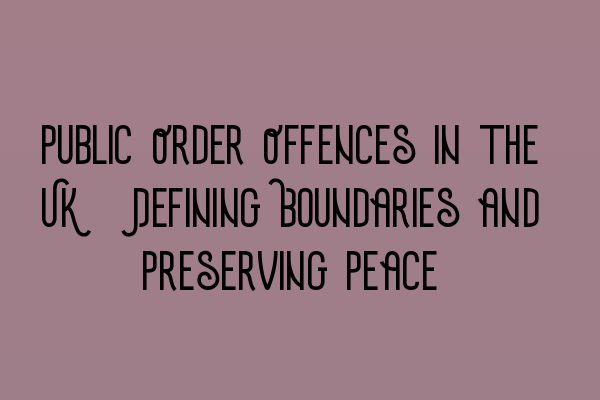Public Order Offences in the UK: Defining Boundaries and Preserving Peace
Welcome to the SQE Criminal Law & Practice Law UK blog! Today, we will delve into the topic of public order offences in the UK and discuss their importance in defining boundaries and preserving peace within society.
Understanding Public Order Offences
Public order offences are criminal offenses that relate to disorderly conduct, disturbance, or behaviors that might cause a breach of peace in public spaces. These offenses aim to maintain public order and protect the rights and safety of individuals within society.
Examples of public order offences include but are not limited to:
- Disorderly conduct
- Breach of the peace
- Threatening or abusive behavior
- Violent conduct
- Trespassing
Public order offenses can range from minor disturbances to serious acts that disrupt public tranquility. It is crucial for individuals to understand the boundaries set by the law to uphold social harmony and avoid legal repercussions.
Preserving Peace and Promoting Order
Preserving peace and promoting order are fundamental principles in any society. Public order offences play a crucial role in maintaining a safe and harmonious environment for all citizens. By defining boundaries and setting consequences for disorderly conduct, the legal system seeks to deter individuals from engaging in behavior that can lead to chaos or harm.
In order to effectively preserve peace, it is important for law enforcement agencies, legal professionals, and the public to be well-informed about public order offences and their implications. This knowledge enables proactive measures to prevent potential conflicts and ensures that justice is served when offenses occur.
As an aspiring legal professional preparing for the SQE exams, understanding public order offences is vital for a successful career in criminal law. SQE 1 Practice Exam Questions provide a valuable resource to test your knowledge and enhance your understanding of various legal concepts, including public order offences.
Additionally, SQE 2 Preparation Courses offer a comprehensive approach to studying criminal law and practice, equipping you with the skills necessary to handle cases involving public order offenses. These courses provide a solid foundation in legal principles, practical skills, and ethical considerations.
SRA SQE Exam Dates and Preparation
If you are interested in becoming a qualified solicitor in the UK, it is essential to stay updated with SRA SQE Exam Dates. Being aware of the exam schedule allows you to plan your study routine effectively and prepare for the SQE 1 and SQE 2 exams.
To further enhance your preparation for the SQE exams, practice mocks FLK1 FLK2 are highly recommended. These mock exams simulate the real exam conditions, allowing you to assess your current knowledge and identify areas that require further attention.
By investing time into SQE 1 Preparation Courses, you can gain the necessary knowledge and skills to excel in the SQE exams. These courses cover a wide range of legal topics, including public order offences, and provide guidance on exam techniques and strategies.
In conclusion, public order offences play a critical role in defining boundaries and preserving peace in society. It is essential for legal professionals, aspiring solicitors, and the general public to familiarize themselves with these offenses and their implications. By understanding and respecting the law, we can work together to create a harmonious and safe environment for all.
We hope you found this blog post informative and helpful. For more legal insights and resources, connect with SQE Criminal Law & Practice Law UK to stay updated.
